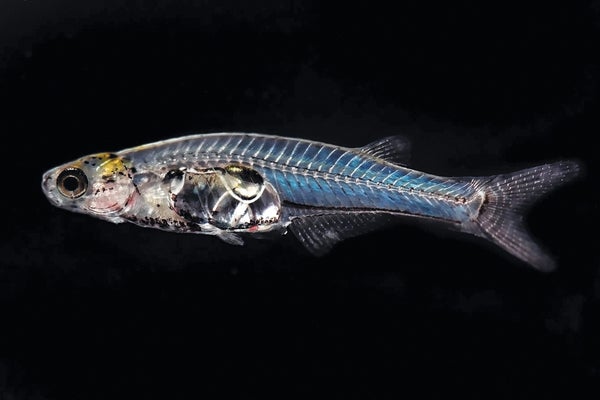This Small Fish Tends to make an Ear-Blasting Screech for Like
A rice-grain-sizing fish screams louder than a jackhammer—and we have a good deal to discover from its minuscule mind
Danionella cerebrum is clear from birth—and extremely loud.
Dave McNabb/Bolton Library and Museum
In the streams of south-central Myanmar life a creature that could be quickly mistaken for a sentient grain of rice—a grain of rice, that is, with a lot to say and a voice like a jackhammer.
At just 12 millimeters extended, the clear fish Danionella cerebrum is between the smallest vertebrates alive, but it may well be the world’s loudest animal by bodyweight. Measured underwater and at close range, male D. cerebrum’s phone calls arrive at an astonishing 140 decibels. That’s as loud as a firecracker, claims Verity Cook, a researcher at Charité–Berlin College of Medicine who scientific studies brain activity through acoustic communication. To human ears above drinking water, the fish’s connect with sounds like a limited chirp or a buzzy whine, and it can past much more than a moment.
But why does such a little fish scream so loudly? From time to time, it looks, “it’s a like music,” suggests University of Lisbon marine biologist Clara Amorim, co-creator of a the latest review on D. cerebrum in the Journal of the Acoustical Society of The usa. Amorim and her colleagues when compared the selection of eggs laid by populations of the fish in distinct tanks. And it was the chattiest groups—not essentially the largest—that appeared to lay the most eggs.
On supporting science journalism
If you’re enjoying this report, take into account supporting our award-winning journalism by subscribing. By getting a membership you are assisting to ensure the potential of impactful tales about the discoveries and concepts shaping our globe these days.
It could be that D. cerebrum’s screechy serenade encodes details about a male’s health and fitness, Amorim says. She notes that belting so loudly for a moment straight involves an outstanding financial commitment of power and that ladies may well want mates with vocal stamina. In some vocalizing fish species, a male’s ballad can even speed up the maturation of a female’s eggs and boost spawning.
Cook not too long ago identified that male D. cerebrum make their breathtaking appears by fast contracting muscle groups that power a minuscule piece of cartilage to beat like a drum versus their swim bladder, an air-filled organ some fish use to control their buoyancy.
No matter what D. cerebrum is telling females with its loud calls, it also has a great deal to explain to researchers about how the mind works, Cook dinner states. The diminutive fish have emerged as a promising model animal for neuroscience: they stay clear their entire life, and the best of their skull under no circumstances closes, resulting in one thing like a cranial sunroof. This implies that, with the support of genetic enhancing and fluorescent proteins, scientists can enjoy specific neurons basically gentle up as they come to be energetic, Cook dinner clarifies. She suggests D. cerebrum’s gabbiness gives a prospect for researchers to chart the neural pathways involved in vertebrates’ generation and processing of seem.
D. cerebrum has the smallest brain of any living vertebrate—scarcely even larger than a poppy seed. But Cook dinner warns that it should not be underestimated. “Even small fish with minimal brains have elaborate, appealing behaviors,” she says. And, it looks, really like life.










